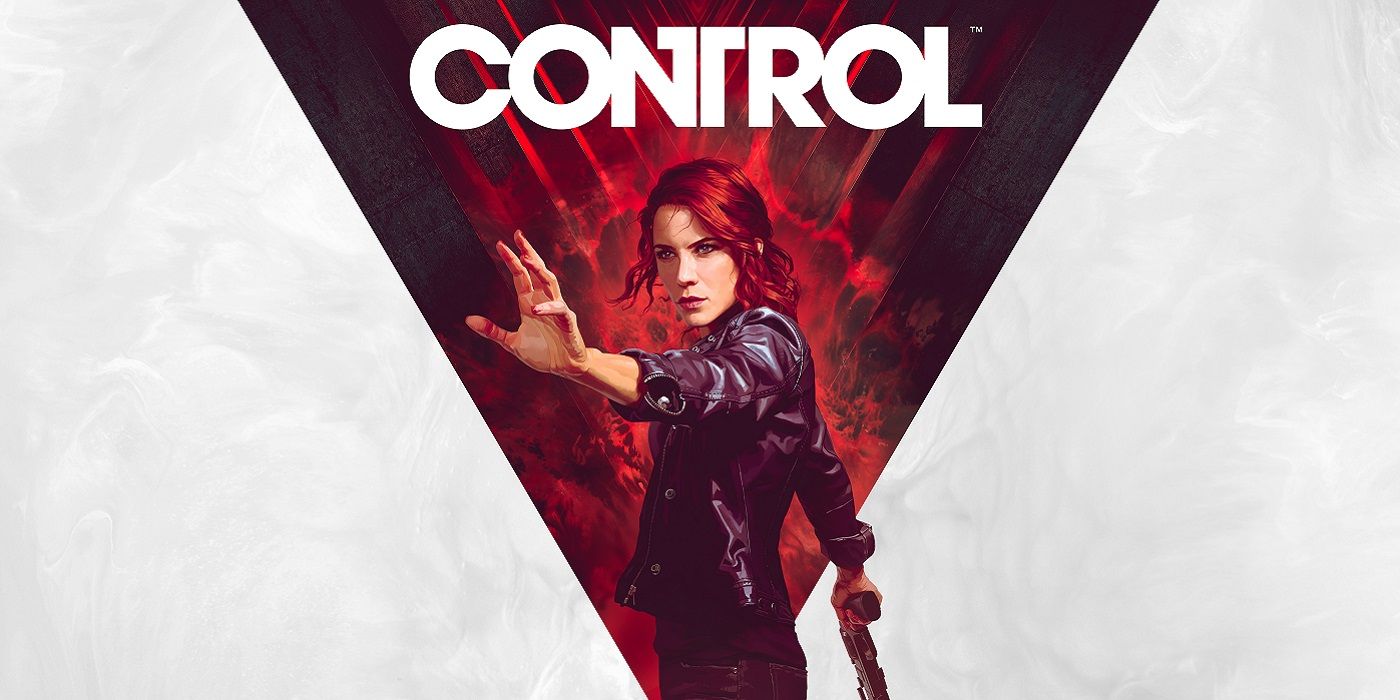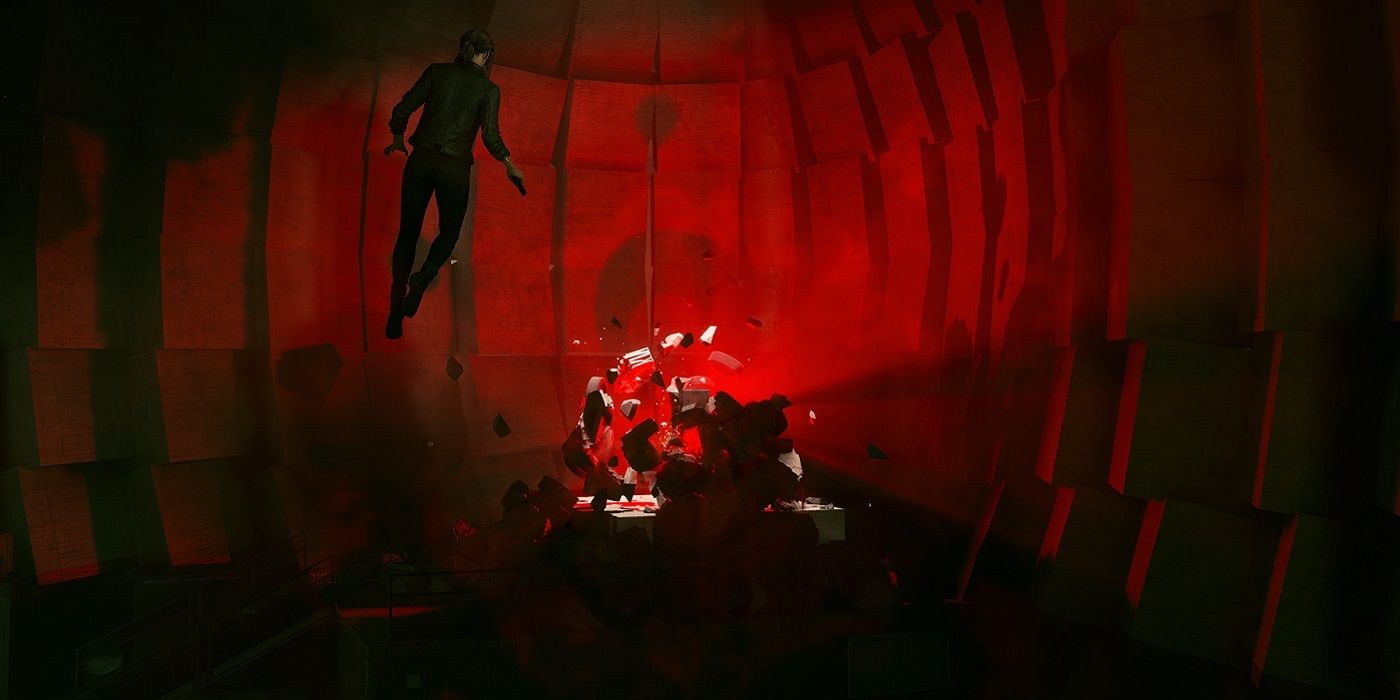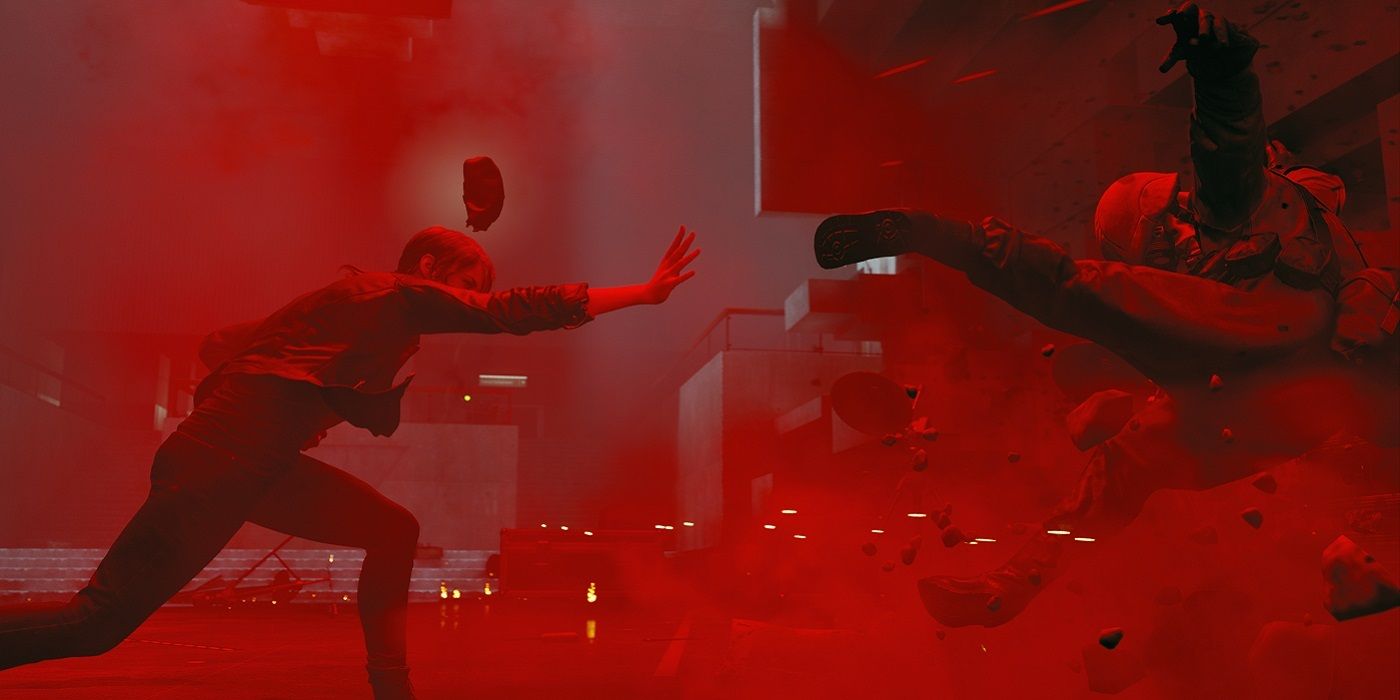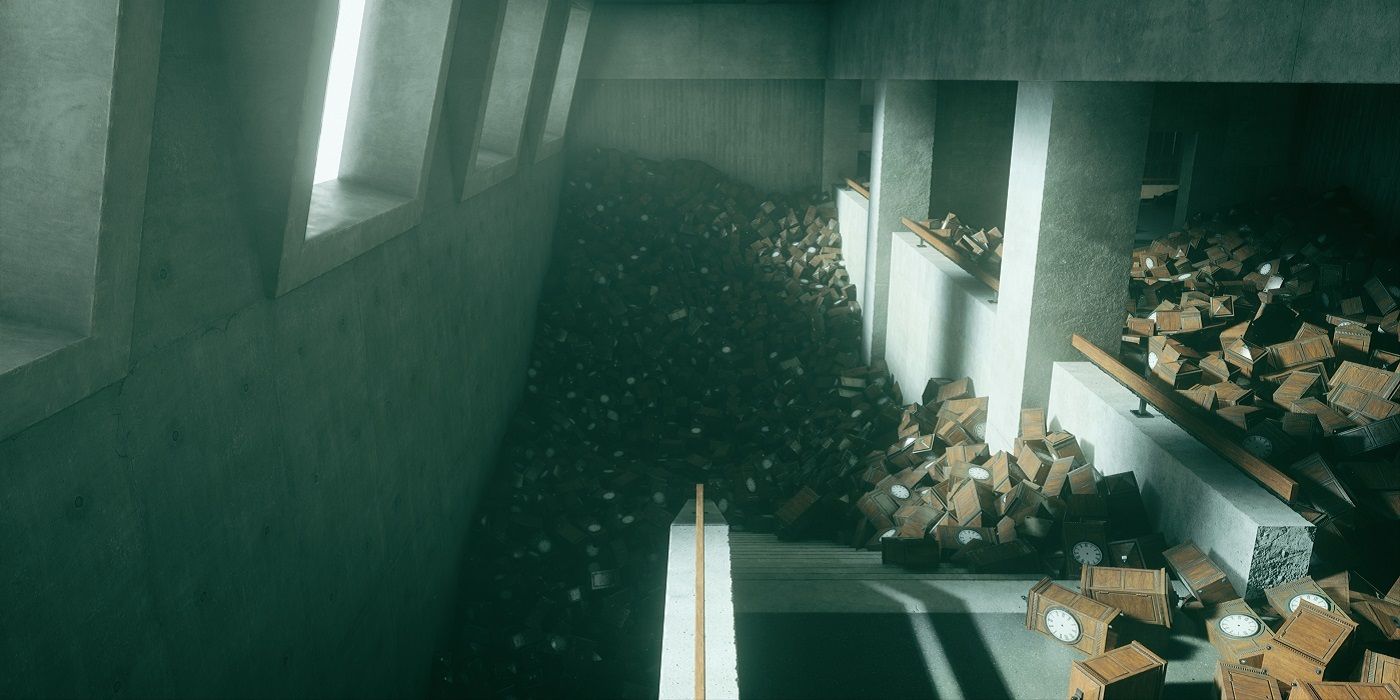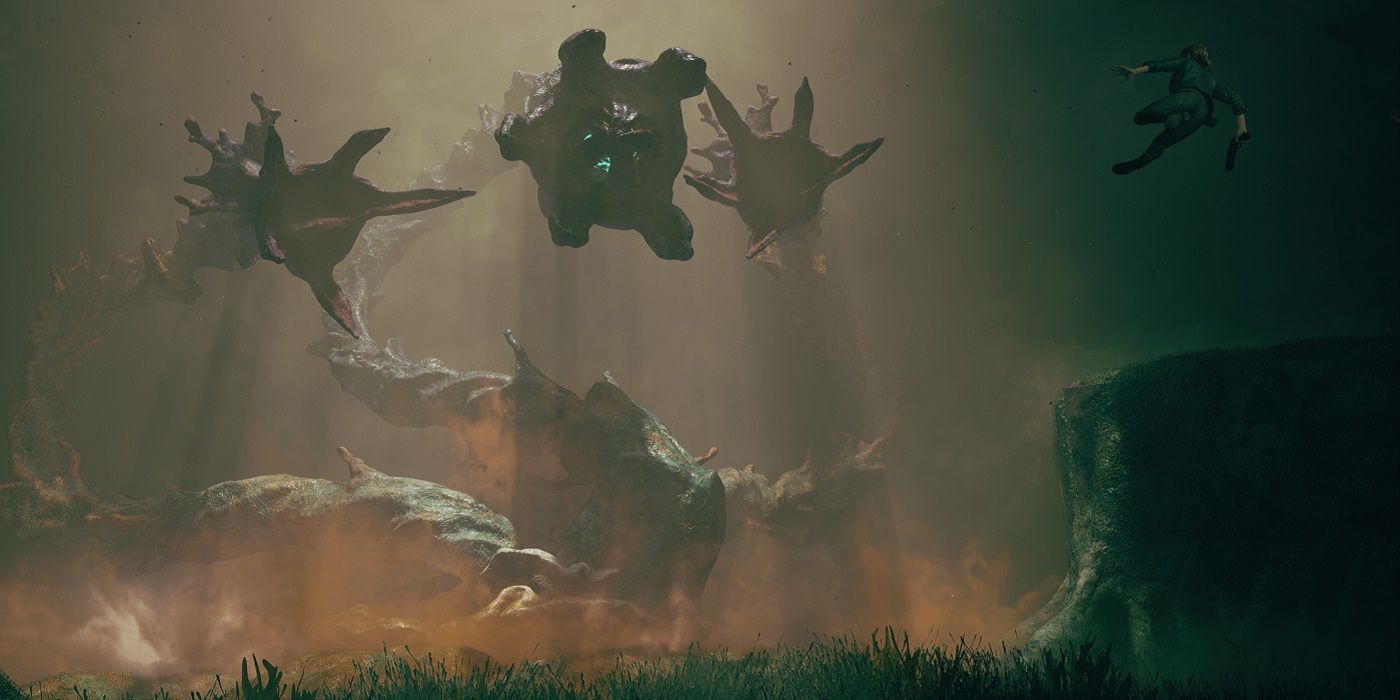In today's gaming industry, many games strive for realism, often at the expense of fun. Developers put painstaking hours into making sure their characters move like real people, which often has the side effect of characters feeling slow or getting caught up on objects in the game world. Control's Jesse Faden does not move like a real person, even before she gains the ability to zip around at absurd speeds and fly through the air. She is always running at full speed, without ever having to stop and catch her breath, and she easily vaults over objects or knocks them out of the way. In Control, Jesse certainly doesn't move around like a "real" person, but she's a blast to control, especially as her move-set expands. The result is a game that is consistently fun to play from minute to minute, and while that comes at the expense of "realism," it's a sacrifice we'd make every single time.
Jesse doesn't move like a real person, and she also doesn't really act like a real person, but just like the ease of moving Jesse around the environment helps the gameplay, her bizarre personality benefits the plot. Control is about Jesse finally locating a mysterious government agency called the Federal Bureau of Control (FBC) that she believes kidnapped her brother. The FBC resides in a creepy, shape-shifting building known as The Oldest House, and it's there where Jesse acquires the special Service Weapon gun and is volunteered to fight off an evil supernatural presence in the building that she names the Hiss.
Jesse embraces these strange occurrences pretty much right away, and there's a reason for that, but we don't want to reveal too many story details. She talks to herself throughout the game, and her interactions with the surviving FBC agents that she works with are fun to watch. Jesse is a strange character, but her weirdness is also charming and makes her much more interesting than the sea of generic action game protagonists that are out there.
Control doesn't spend a ton of time with cut-scenes, instead opting to have the player directly in control of Jesse more often than not, traversing the environment and fighting off the Hiss. Combat is exciting and fast-paced, and only gets better as the game goes on and the player is given more options. Jesse's supernatural abilities play a big role in how players approach each encounter, with her Evade ability perfect for avoiding enemy projectiles, and her Launch power letting her pick up virtually any item in the environment and hurl it at the Hiss. Since the supernatural abilities are tied to a stamina meter and Jesse's gun has to be reloaded, there is a certain rhythm to the combat that players can practice so they are constantly on the offensive, and it makes each encounter a blast.
Combat in Control is aggressive. Since Jesse is healed by picking up items dropped by enemies, she can't really stay behind cover, and players won't want to anyway. The game is at its best when Jesse is zipping around the environment, catching enemy rockets with her mind and throwing them back, all the while mixing in shots with the Service Weapon. Remedy has often been praised for its innovative shooting mechanics in games like Max Payne and Quantum Break, and Control may honestly be the studio's best game yet when it comes to combat.
Control also offers a bit more depth than many other Remedy games, thanks to a loot system and the ability to upgrade the Service Weapon as well as Jesse's abilities. Players earn Ability Points that can be spent to greatly diversify Jesse's ability suite, and crafting materials can be used to completely change the Service Weapon's functionality. Jesse can have two versions of the Service Weapon equipped at any time, and so figuring out the best one to use for any given situation adds another layer of strategy to each fight. We found great success using the Pierce form, which allows Jesse to charge her shots and deals devastating damage at the cost of half her ammo, which forced us to line up shots perfectly while still moving quick enough to avoid taking damage from enemies.
Control's combat is truly second-to-none, and makes up the majority of one's time with the game. However, fighting off the Hiss is not the only thing players do in Control. There's also a decent amount of exploration, which is actually where the game stumbles a bit. The Old House is confusing on purpose, and while that makes it an interesting setting thematically, it can be problematic from a gameplay standpoint, as it's not always clear where exactly Jesse needs to go to advance the plot or reach a specific area. This can become frustrating at times, especially when the map doesn't display properly, which was a consistent issue we had during our time with the game.
While figuring out where to go can sometimes be a pain, actually traversing the Old House is a lot of fun thanks to Jesse's abilities. And just like the combat, moving around the game world becomes progressively more entertaining as the game goes on. It helps that the Old House's strange geometry lends itself well to quick but exciting platforming challenges, which aren't often seen in shooters of this nature.
When exploring the Old House, Control players will find the game's Stanley Kubrick influences pretty much everywhere they go. More specifically, Control appears to be inspired by Kubrick's The Shining, with maze motifs, similar-looking carpet patterns, and foreboding shots of elevator doors opening. The game may have also been inspired by the mini-series The Lost Room, as much of the plot revolves around seemingly normal objects that have supernatural abilities called "Objects of Power."
Besides imagery in the game invoking The Shining, Control has other horror elements as well. The Hiss often leave people floating in the air, in a manner not unlike Pennywise the Clown's victims in Stephen King's It. The soundtrack is unnerving and frequent use of blood red colors help to make the player uneasy. The comparisons to Remedy's Alan Wake are well-earned.
Control even has some moments that some may consider "scary." There are a handful of jump scares, and the game does a good job of building tension at key moments. Control may not be a full-fledged horror game, but it's still a game horror fans will enjoy.
Horror game fan or no, one aspect about Control that may make some hesitant to pick it up is its short length. Previously, it was claimed by the developers that an average playthrough of Control takes 10-15 hours, with 20 hours total for someone who wants to complete all of the side missions and extra content. In our testing, we were able to complete the main story much faster, with it taking around eight hours, and that included a handful of the side missions as well. Doing everything would add two to three more hours depending on skill level, and so we don't think it's that unrealistic to say that Control can be completed 100% in 15 hours or less.
For those who measure the worth of a game by playtime, they may want to think twice about paying full price for Control. However, it's worth pointing out that many games artificially lengthen the experience with time-wasters that serve no purpose other than to make the game longer. Control has no filler. Every single side mission is fun, and they often feature some of the best boss fights in Control, featuring Lovecraftian monsters that really put players' skills to the test. Control isn't a terribly long game, but it never feels like it's wasting the player's time, and every mission is actually compelling.
Control is a short game and has occasional technical hiccups, but it's still a fantastic experience all-around and quite possibly Remedy's best game yet. The combat is exciting and satisfying, the game is gorgeous, and horror fans will enjoy the creepier elements. Control has shown promise since its surprise E3 2018 reveal, and we're happy to report that it meets expectations and even exceeds them.
Control launches August 27 for PC, PS4, and Xbox One. Game Rant was provided an Xbox One code for this review.

